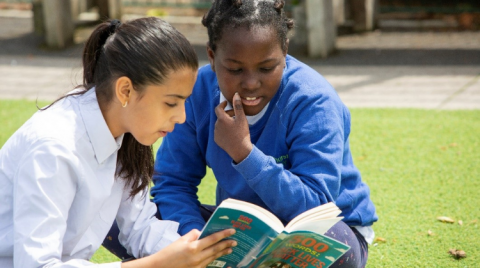Supporting Reading for Pleasure Inside and Outside the Classroom

Professor Teresa Cremin, Professor of Education (Literacy) at The Open University, takes a look at the role Reading for Pleasure plays in children's literacy, both in and beyond the classroom.
As the academic year gets underway again, it is timely to explore the key role Reading for Pleasure (RfP) plays in children’s literacy and in overall attainment. Governments around the world are now paying attention to RfP as a core strand of supporting literacy and reading attainment and Ofsted is looking to see evidence of a rich and wide reading curriculum.
Research shows that some of the significant benefits of children’s reading for pleasure include:
- Increased attainment in literacy and numeracy (eg. OECD, 2010; Sullivan & Brown, 2013);
- Improved general knowledge (eg. Clark & Rumbold, 2006); richer vocabulary (e.g. Sullivan & Brown, 2013);
- Support in identity exploration (eg. Rothbauer, 2004);
- Enhancement of imagination and empathy (eg. Kidd & Costano, 2013).
It is, therefore, no surprise that developing a love of reading is officially recognised as being essential to children’s education.
Looking at Reading for Pleasure Beyond the Classroom
As a society, we must continue to ensure children have access to a rich range of reading material both inside and outside of school.
The National Literacy Trust recently reported that whilst many children read and enjoyed reading more during lockdown, those children and young people without access to books (due to the closure of schools and libraries) had seen a negative effect on their ability to read and their motivation to read for enjoyment.
There are many ways in which educational practitioners and parents can nurture a love of reading in children. In fact, the Open University’s Reading for Pleasure website is packed with practical tips and ideas for how to ignite and inspire children’s desire to read.
Why not try some of these ideas to encourage the children in your life to read more and enjoy the wonderful world of storytelling:
- Read award winners – Checking out award-winning books is a great way to make sure you’re staying up-to-date with children’s literature. From Carnegie and Kate Greenaway, Lollies, Blue Peter, Costa, School Library Association, UKLA, Smarties and more besides, there are lots of book awards to choose from.
- Read to your knee or thigh in books! An interesting and appealing challenge, no matter the age.
- Create your very own library shelf so you can display, discuss and recommend texts.
- Read outside your ‘comfort zone’: try graphic novels, world literature, nonfiction, poetry, comics or magazines.
- Create your own reading ‘den’, a nice cosy space to explore the tempting texts on offer.
How can schools support Reading for Pleasure?
One of the ways that schools are showcasing their commitment to RfP is by developing physical spaces for reading communities. Many have refurbished their libraries, and some even purchased double-decker buses, tents, sheds, tree houses and caravans to deck out! Spaces have been furnished with cushions, carpets and sofas to enrich classroom reading areas.
These often-colourful spaces indicate to parents, governors, Ofsted inspectors and the children, that the school values reading. However, it is vital to fill these special reading areas with a rich array of texts and to ensure there are ample opportunities for children and teachers to engage in informal ‘book blether’ in these spaces.
Develop your knowledge of Reading for Pleasure
Teachers’ Reading Groups are a fantastic way of staying up-to-date with reading for pleasure. These groups provide free CPD for teachers, teaching assistants, early years professionals, librarians and others to enrich their understanding of reading for pleasure (RfP) and how to support children as readers. To date, The Open University and the UK Literacy Association have supported 300 Teachers’ Reading Groups in England and groups in Wales, Scotland, Ireland, Dubai and Pakistan.
Find out more
- The Open University’s Reading for Pleasure (RfP) website seeks to support a vibrant professional community of teachers, student teachers, librarians, teaching assistants and literacy coordinators.
- If you’re interested in joining an OU/UKLA Reading Group, find out more and contact the organisers via this page.
This article has been adapted from Professor Cremin’s blog on www.books2all published on 8 September 2021.
Are you already an OU student?
Request your prospectus
Explore our qualifications and courses by requesting one of our prospectuses today.
Request prospectus